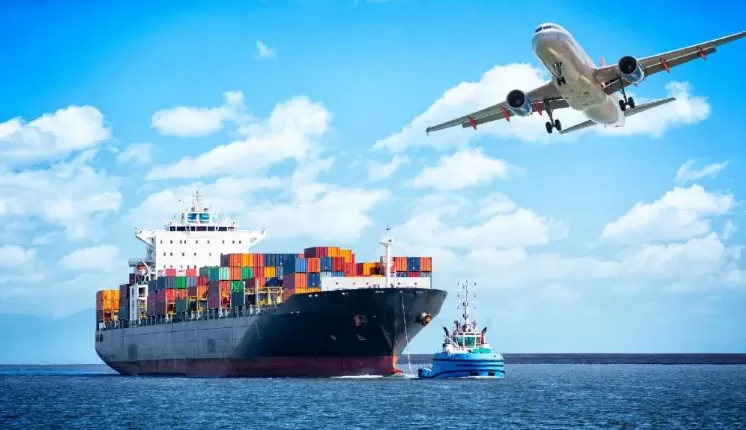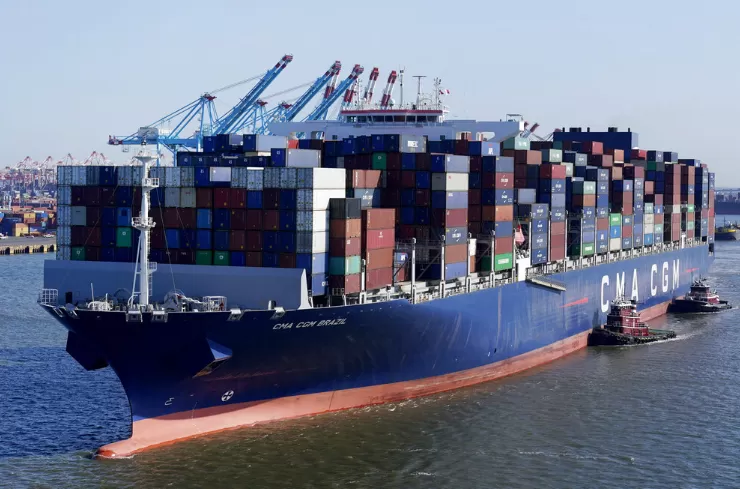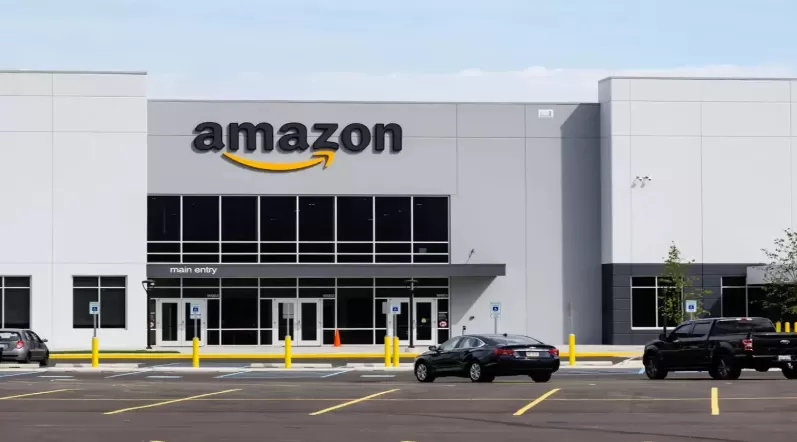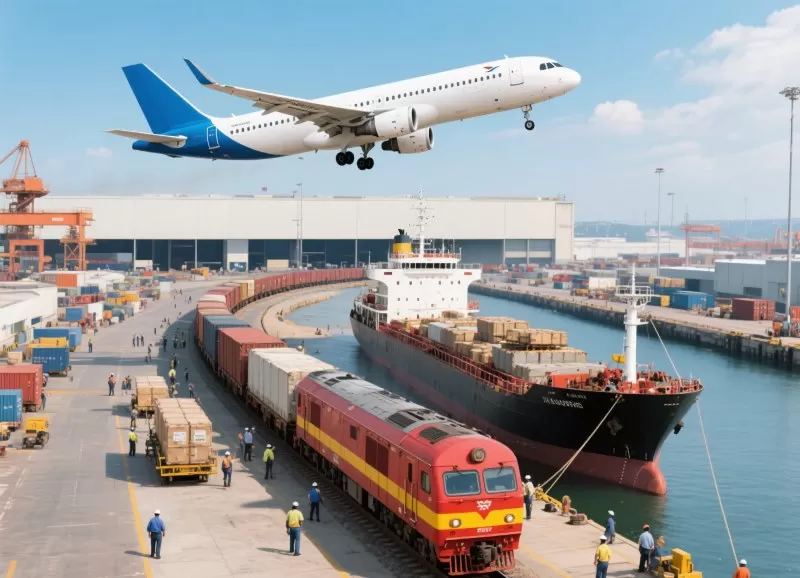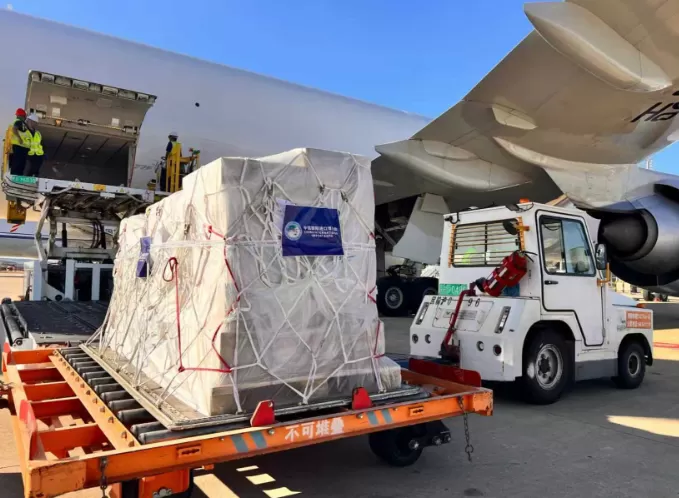Let's talk about Frankfurt. When your cargo needs to reach the heart of Europe, you're not just picking a city—you're choosing a strategic hub. Frankfurt is more than a destination; it's Europe's central logistics nervous system.
Whether you're an Amazon FBA seller racing against inventory deadlines or managing complex industrial supply chains, getting your goods from China to Frankfurt efficiently can make or break your European operations.
Here's what most guides don't tell you: The right shipping method isn't just about cost versus speed. It's about understanding how Frankfurt's unique position as both an air cargo powerhouse and inland distribution hub can work to your advantage.
In this guide, we'll walk through exactly how to leverage Frankfurt's infrastructure—whether you're shipping a 10kg express parcel or multiple 45'HC containers. You'll learn not just how to get there, but how to do it smarter than your competitors.
Are you ready?
Get real-time quotes for Frankfurt
Get Quotes
Why Frankfurt Isn't Just Another Destination
Most ports and cities serve as endpoints. Frankfurt serves as a multiplier.
The Airport Advantage:
Frankfurt Airport (FRA) isn't just Germany's busiest cargo hub—it's consistently among Europe's top three. What does this mean for you?
More direct flights from Chinese hubs like Shanghai (PVG) and Beijing (PEK)
Superior infrastructure for temperature-sensitive, high-value, or urgent goods
Faster turnaround times with dedicated cargo terminals
The Inland Advantage:
Here's where Frankfurt really shines. Even if your goods arrive by sea at Hamburg or Rotterdam, Frankfurt's central European position makes it the perfect distribution point. The Rhine-Main region hosts countless distribution centers for a reason: you can reach 40% of Europe's purchasing power within a 500km radius.
The Customs Advantage:
Frankfurt operates as an inland port with sophisticated customs facilities. This means you can clear customs away from congested seaports, often with faster processing times from more specialized officials.
Your Shipping Options: A Deep Dive Into Each Method
Air Freight: When Every Hour Counts
If your supply chain can't afford 30+ day delays, air freight to Frankfurt Airport is your solution. But understanding the pricing tiers is crucial.
The Weight Break Reality:
100kg shipments typically sit in the standard rate category
200kg shipments often qualify for better rates—sometimes 15-20% lower per kilogram
500kg+ volumes can access contract rates that dramatically reduce costs
What You're Really Paying For:
Beyond the base air freight rate, you're covering:
Fuel surcharges (which can fluctuate wildly)
Security fees at both origin and destination
Handling charges at FRA's cargo terminals
The last-mile trucking from the airport to your final destination
The real value isn't just speed—it's predictability. While sea freight can vary by weeks, air freight from China to Frankfurt typically takes 5-10 days door-to-door with minimal deviation.
Sea Freight LCL: The Smart Choice for Growing Businesses
Less than Container Load (LCL) shipping democratizes ocean freight for businesses that don't need full containers. But not all LCL is created equal.
Volume Economics in Practice:
1 CBM shipments hit the minimum charge threshold, making them relatively expensive per CBM
5 CBM represents the sweet spot where per-CBM costs become significantly more efficient
10 CBM volumes often access the best rates before approaching FCL territory
The Consolidation Process:
Your goods are never alone in an LCL container. They're consolidated with other shipments at specialized warehouses, then deconsolidated upon arrival in Hamburg or Rotterdam before trucking to Frankfurt. This adds 3-7 days to your transit time but saves 60-80% compared to air freight.
Sea Freight FCL: Maximum Control for Maximum Volume
When your business scales to container-level volumes, FCL (Full Container Load) becomes your most cost-effective option. But container choice matters more than you might think.
Choosing Your Container Wisely:
20' Container: Perfect for dense, heavy goods (think machinery or building materials)
40' Container: The workhorse for most general cargo
40' High Cube: The smart choice for lightweight but bulky items (furniture, packaging materials)
45' High Cube: Maximum capacity for established importers with consistent volumes
Service Level Decision: Port-to-Port vs. Door-to-Door
Port-to-Port works if you have logistics teams in both China and Germany
Door-to-Door simplifies everything but costs 15-30% more
Sea Truck services combine ocean freight with dedicated trucking to Frankfurt
The container shortage taught us all a valuable lesson: booking FCL shipments 4-6 weeks in advance isn't just about securing space—it's about securing the right price.
Express & Rail: The Specialists
Express (DHL, UPS, FedEx):
For shipments under 120kg, express carriers offer unbeatable simplicity with full door-to-door service. For 10kg samples or urgent documents, they're often your only practical choice.
Rail Freight:
The China-Europe rail network has matured into a reliable middle ground—faster than sea (18-25 days), cheaper than air. It's particularly valuable for goods too time-sensitive for ocean shipping but not valuable enough to justify air freight premiums.
The Amazon FBA Playbook: Frankfurt as Your EU Hub
If you're selling on Amazon in Europe, Frankfurt isn't just convenient—it's strategic.
Why the Rhine-Main Region Works for FBA:
Multiple FBA fulfillment centers within 200km
Superior transportation infrastructure for quick replenishment
Larger pool of logistics partners specializing in Amazon requirements
Your FBA Shipping Decision Matrix:
Critical Stock-Out Situation: Air freight to FRA + express delivery to FBA
Regular Replenishment: LCL shipping with Sea Truck service to FBA
Seasonal Buildup or New Product Launch: FCL containers with dedicated FBA delivery
The secret most successful FBA sellers learn: Don't just think about getting inventory to Amazon—think about maintaining consistent flow. That often means mixing methods rather than relying on just one.
Costs, Timelines & How to Avoid Delays
What You'll Actually Pay: A Realistic Price Framework
Let's talk numbers. These are current market ranges for door-to-door services to Frankfurt:
Air Freight:
100kg: $4.50 - $7.00/kg
200kg: $3.80 - $6.20/kg
500kg+: $3.20 - $5.50/kg
Sea Freight LCL:
1 CBM: $90 - $150 (minimum charge applies)
5 CBM: $80 - $130/CBM
10 CBM: $75 - $120/CBM
Sea Freight FCL:
20' Container: $1,800 - $3,000
40' Container: $2,800 - $4,500
40' High Cube: $3,000 - $4,800
Remember: These are reference points, not quotes. The market moves daily based on capacity, fuel costs, and demand.
Realistic Transit Times: What to Expect
Air Freight: 5-10 days door-to-door
Sea Freight LCL: 30-40 days door-to-door
Sea Freight FCL: 28-35 days door-to-door
Rail Freight: 18-25 days door-to-door
These timelines include everything from pickup in China to customs clearance and final delivery in Frankfurt. The sea freight estimates already account for the inland trucking from Hamburg/Rotterdam.
freight forwarding
Get real-time quotes for Frankfurt
Get Quotes
Why Delays Happen & How to Prevent Them
"I thought my shipment would be here by now" is the most common frustration in international shipping. Here's what's probably happening:
Customs Clearance Issues:
This is the number one cause of delays. The solution is perfect documentation:
Commercial invoices with precise goods descriptions
Correct HS codes for German import
Complete packing lists with individual box contents
Port & Terminal Congestion:
Hamburg and Rotterdam both experience periodic congestion. The fix: Build a 5-7 day buffer into your planning during peak seasons (August-December).
Carrier Schedule Changes:
Vessels are frequently behind schedule. The workaround: Work with forwarders who have multiple carrier relationships and can pivot when necessary.
The pattern here is clear: most delays are preventable with proper planning and partnership.
10 Practical Strategies to Reduce Costs & Improve Reliability
After coordinating thousands of shipments to Frankfurt, we've identified the most effective cost-saving strategies:
Consolidate Like with Like: Group similar products in LCL shipments to simplify customs clearance and reduce inspection risk.
Optimize Packaging Early: Most air freight costs are based on volumetric weight. Reducing package size by 20% can cut air freight costs by the same amount.
Leverage Weight Breaks: If you're shipping 180kg by air, check the 200kg rate—it might be cheaper to ship the full 200kg.
Book Ocean Freight Early: Securing FCL space 4-6 weeks in advance typically saves 15-30% versus last-minute bookings.
Consider Alternative Ports: Sometimes shipping via Rotterdam or Antwerp with trucking to Frankfurt is faster and cheaper than direct Hamburg routing.
Implement Hybrid Strategies: Use air freight for your fastest-moving SKUs while maintaining sea freight for slower movers.
Standardize Your Documentation: Create templates for commercial invoices that you know will clear German customs smoothly.
Develop Relationship Pricing: Work with a primary forwarder long enough to access their best contract rates.
Monitor Currency Flips: Sometimes paying in EUR versus USD (or vice versa) can yield surprising savings.
Audit Every Invoice: 40% of freight invoices contain errors. Systematic auditing typically recovers 3-5% of shipping costs.
Choosing Your Logistics Partner: What Really Matters
Your freight forwarder can make or break your European expansion. Here's what separates adequate partners from exceptional ones:
Frankfurt-Specific Capabilities:
Do they have a physical presence or vetted partners in Frankfurt?
Can they handle customs clearance at Frankfurt's inland ports?
Do they have relationships with trucking companies serving the Rhine-Main region?
Communication & Technology:
Do they provide proactive updates rather than making you chase information?
Is their tracking system real-time and accurate?
Can they integrate with your inventory management systems?
Problem-Solving Ability:
The true test of a forwarder isn't how they handle smooth shipments—it's how they navigate disruptions. Ask for specific examples of how they've resolved customs holds, carrier failures, or other emergencies.
Ready to Optimize Your Frankfurt Supply Chain?
The journey from China to Frankfurt involves complex decisions, but the framework is straightforward: match your shipping method to your business needs rather than defaulting to what you've always done.
The most successful importers we work with treat logistics as a strategic function rather than a tactical necessity. They understand that the right partnership and approach doesn't just save money—it creates competitive advantages through reliability and speed.
Your Next Step:
We help businesses like yours navigate these decisions daily. Whether you're looking for a one-time shipment or a long-term logistics partnership, we provide the clarity and expertise you need.
[Get Your Personalized Frankfurt Shipping Assessment] → Shipping from China to Germany
FAQs
1. Q: My supplier is handling the China-side shipping. What documents do I need from them to control the goods in Germany?
A: This is crucial. You must get the Master Bill of Lading (MBL) or Air Waybill (AWB) from them. Whoever holds the original MBL controls the cargo. Without it, you're dependent on your supplier's agent in Germany to release your goods, which can lead to delays and extra fees. Always insist on receiving these "title documents."
2. Q: What's the difference between volumetric weight and actual weight, and which one will I be charged for?
A: Carriers charge based on whichever weight is greater. Actual weight is what the scale says. Volumetric weight is a calculation (Length x Width x Height in cm / 5000 for air, / 1000 for sea LCL) that estimates the "space" your cargo occupies. For lightweight, bulky items (like pillows), you'll always pay the volumetric weight. It's why optimizing your packaging is so important.
3. Q: I'm shipping for the first time. What's the biggest hidden cost I should watch out for?
A: Beyond the freight quote, first-timers are often surprised by Destination Handling Charges. These are fees from the warehouse at the destination port or airport for unloading, handling, and storing your cargo until it's picked up. They're not always broken down in initial quotes. Always ask for an "all-inclusive door-to-door quote" to see these charges upfront.
4. Q: Can I ship items with built-in batteries to Frankfurt?
A: Yes, but it's strictly regulated. Items containing batteries (like a laptop) are generally fine with proper documentation. However, loose batteries or power banks are classified as dangerous goods. They require special packaging, labeling, and a Dangerous Goods Declaration, which can add significant cost and complexity, especially for air freight.
5. Q: What are Incoterms, and which one should I use for my shipment?
A: Incoterms are international commercial terms that define who is responsible for the goods, costs, and risks at each stage. For simplicity and control, we recommend EXW (Ex Works) if you want your forwarder to handle everything from your supplier's door, or FCA (Free Carrier) if your supplier will deliver to a terminal in China. Avoid FOB if you want true door-to-door control, as responsibility shifts to you once the goods are on the vessel.
6. Q: How does the time of year affect my shipping costs and time?
A: Significantly. The peak season (August through November) sees rates spike and transit times extend due to high demand for holiday goods. Chinese New Year (January/February) causes massive factory closures and a rush to ship beforehand, creating similar congestion. Booking well in advance during these periods is non-negotiable.
7. Q: What happens if my shipment is too small for LCL (e.g., 0.5 CBM)?
A: For very small volumes, you have two main options: International Express (DHL/UPS) which is simple but can be expensive, or a Consolidation Service specifically for small parcels. Some forwarders group multiple small parcels into a single LCL shipment, offering a more economical rate than standard LCL minimums.
8. Q: What's the advantage of using a freight forwarder versus booking directly with a shipping line?
A: A forwarder acts as your single point of contact and project manager. We compare rates across multiple carriers, handle the complex documentation for you, manage the handoffs between different transport modes, and solve problems when they arise. Booking directly with a carrier is like buying airplane wings without the rest of the plane—you only get one leg of the journey and no integrated support.
9. Q: My goods arrived in Hamburg, but now I need them in Frankfurt. What's the process for the inland part?
A: This is called the "on-carriage" or inland transportation. Your freight forwarder will arrange for a truck to pick up the container from the Hamburg port terminal. It will then be driven to a warehouse in the Frankfurt area for de-stuffing (if it's FCL) or directly to your final address. This process typically adds 2-4 days and a separate trucking cost to your timeline.
10. Q: What is a customs bond, and will I need one for importing into Germany?
A: A customs bond (or guarantee) is essentially an insurance policy for the German customs authorities. It ensures that all import duties and taxes will be paid. If you are established outside the EU, you will almost always need one, which your customs broker or forwarder can arrange. If you are VAT-registered in Germany, you may not need a separate bond.

 EN
EN
 FR
FR
 ES
ES
 JA
JA
 PT
PT
 RU
RU
 AR
AR
